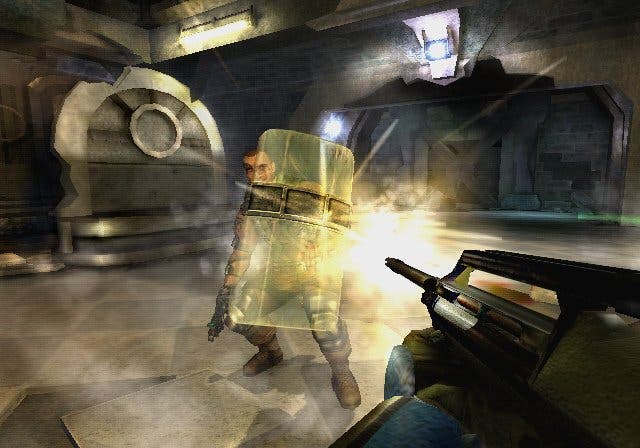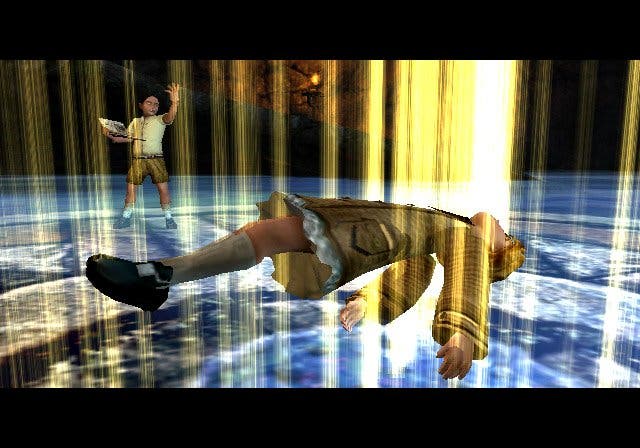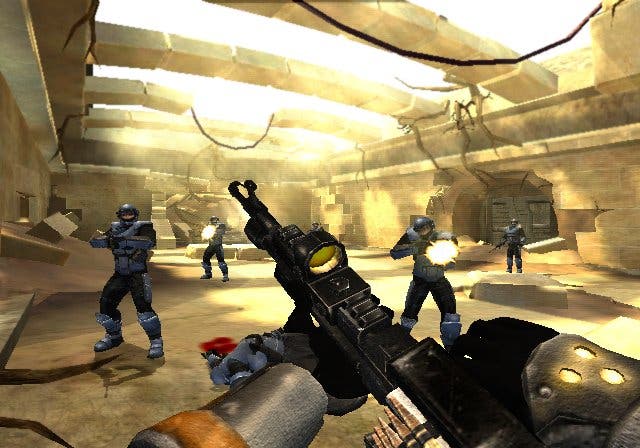Geist
Busted.
We're in an underground military base of some sort, home to nasty experiments. We're holding a big gun, and we're running around with our fellow elite special forces types trying to shoot our way out of it. We're on familiar ground.
Except... What's this? Now we're not on the ground at all. We're floating through the air, seizing control of everything from the cleaner's mop and bucket to the machinegun-wielding patrolman hanging around guarding the expensive equipment. We're... Well, actually, we're still on familiar ground.
Geist is a first-person shooter played from the perspective of an ethereal weakling, which sees you wafting through the hallways and labs of subterranean-military-installation-du-jour possessing things in an effort to open doors and find out what's happened to you and, presumably, how to reverse it.
But, when you think about it, possessing people is all we really do in games anyway. So much so that when a developer gives us a speechless blank canvas of a man to control, like Half-Life's Gordon Freeman for instance, it makes a big difference and lots of people highlight that as a key selling point.
Geist's hook, of course, is that you have to possess lots of different things in order to make progress. Playing the game at a recent Nintendo press event in London, we got to see how central protagonist John Raimi lost control of his body and had to go about controlling others, before scuttling around getting used to the process and being teased by some entertaining scenarios - using a gormless human as a decoy for a grenade-tossing boss, for example, only to leap out of his body and possess the grenade mid-flight in order to detonate it and cause damage to the tosser in question.
It kicks off in a manner akin to any number of other FPS games; John and his SF chums head underground, retrieve some data and make a run for it, leaning round corners blasting at guards, ducking behind crates to reload, getting caught up in the chatter between squad-mates and so on.

Fortunately it soon gets a bit more interesting. As John and pals guard one another across a metal walkway, an ill-fated red-shirt stumbles. He picks himself up. "I'm all right." BAM! He's snatched from above by the gaping jaws of a goodness-only-knows-what, which proceeds to chomp him down in messy fashion. Cue lots of panicked firing amidst easy-to-dodge plasma-like projectiles.
Making it to the extraction point beyond with the faintest sliver of health intact, the team prepares to escape only for the last man to take a funny turn - and blow them all away. He's been possessed. And with that we're treated to a cut-scene demonstrating John's own separation from his physical self, the controls kicking back in as he materialises in a bizarre primary-colour parkland construct full of trees, plants, rabbits and swings.
It's all a bit peculiar. And it only gets more so. John's guide is a sinister little girl named Gigi, who encourages him to suck on plant-life for sustenance, and shows him how to take control of the rabbit. Soon we're hopping around from behind a set of whiskers, and not long after that the whole landscape falls apart and John escapes back into the real world - and starts wandering the base with Gigi in tow, seizing control of all manner of objects and creatures, and utilising them in an effort to obtain key codes, gain tactical advantages and coax workers into doing his bidding.
It's a good idea. Very good in fact. The possibilities are limitless. To call upon Half-Life again, imagine entering Black Mesa before the infamous Resonance Cascade Scenario and using your abilities to disrupt routines, destabilise research and shift the project in a sinister direction. Everyone loves the idea of dark forces pulling strings behind the scenes; imagine being the dark forces and trying to manipulate your way to the heart of the installation, whereupon you could corrupt the administration and open the doorway to the world of your masters. Geist even has a system whereby you have to force potential hosts into a state of emotional vulnerability before you can possess them.

The trouble is that the demo we've played doesn't take the idea very far - and there are whisperings afoot that the rest of the game strives for a more familiar first-person shooter approach, with the obvious benefit of being able to leap from your freshly slain corpse and take control of the bloke who shot you.
We can believe that, because on this evidence it's not particularly subtle. Possessing mops and buckets, making telephones ring, taking over explosive barrels and detonating them are all novel for a while, but there's rather too much, "Man, what the hell's going on!?" from your enemies.
You're expected to open a door by getting somebody to ask a nearby supervisor to unlock the PC terminal that holds the key code. We might as well just be in disguise - playing Medal of Honor with a nazi uniform pick-up or something. Dogs are apparently capable of working out you're not what you seem, so you obviously can't go that way. A lot of it is spelt out for you, and although you're given the opportunity to take over a wide variety of things, there's still far more outside your sphere of influence than within it.
Being shoehorned down corridors and being asked to gather codes are things we've done plenty of, and being unable to take full advantage of the environment, let alone explore it freely, are pretty fundamental to most FPS games as well. Even moving through walls - surely one of the best things that a spectral lifestyle has to offer - has to be done at prescribed points.

We're also quite used to slightly squirmy dual analogue stick FPS controls, and frame rates that raise question marks about optimisation, too. Graphically, we were familiar with this sort of thing before the GameCube even showed up - and Geist could be one of its very last major exclusives.
None of this is to say that Geist developer n-Space hasn't got plenty of tricks up its sleeve (being able to detonate grenades in mid-air by actually becoming them is a neat trick, after all), but there's far more that we recognise at this point than we don't. Which is a bit odd for a game that lets us see the world through the eyes of countless different people and even cleaning products.
It'll take longer than half an hour to find out whether Geist is the serious proposition it has the potential to be, of course, but we're certainly going to need more convincing before we take possession of it ourselves later this year.
Geist is due out exclusively on GameCube within the next few months.




.png?width=291&height=164&fit=crop&quality=80&format=jpg&auto=webp)



